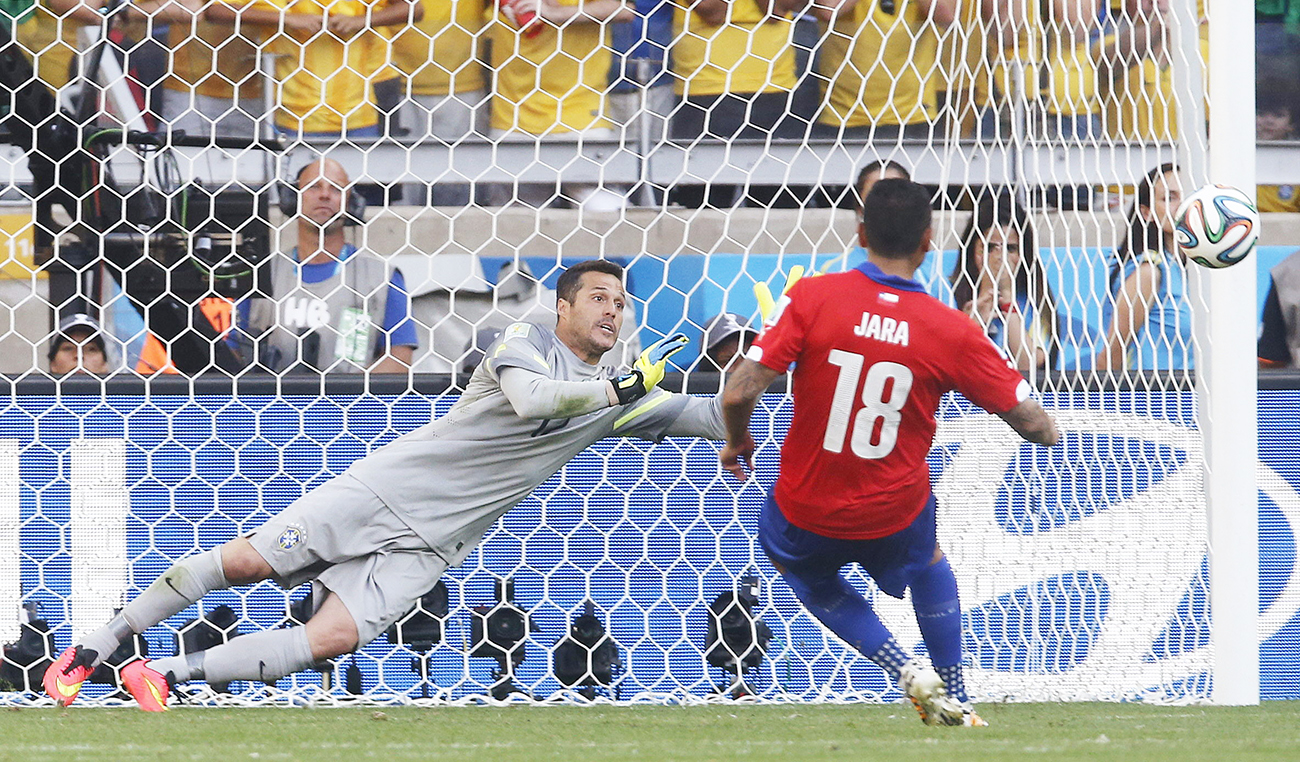
Decision by penalty: The worst or the best of soccer?
Chile’s Gonzalo Jara took the slow, long 45-yard walk from the midfield line on the pitch to the penalty area all alone on Saturday. Thousands of Brazilians were screaming for him to fail. The hopes of his team, and his country, rested on his right foot. When his shot on Julio Cesar tailed just a few inches more than he would have liked and bounced off the right post, the stadium erupted with joy, and Chile’s World Cup dreams were broken.
Chile’s Gonzalo Jara took the slow, long 45-yard walk from the midfield line on the pitch to the penalty area all alone on Saturday. Thousands of Brazilians were screaming for him to fail. The hopes of his team, and his country, rested on his right foot. When his shot on Julio Cesar tailed just a few inches more than he would have liked and bounced off the right post, the stadium erupted with joy, and Chile’s World Cup dreams were broken.
Last weekend highlighted the first games of the round of 16 in the 2014 FIFA World Cup, which brought along two games that were decided by penalty kicks. Both Brazil-Chile and Greece-Costa Rica were tied after 90 minutes, which led them to play two 15-minute overtime periods. When they were tied after those 30 minutes, penalty kicks decided their fate.
With soccer sweeping over the United States in light of the World Cup, it was the first time some newly minted fans of the game saw a match decided by penalty kicks. Many voiced their opinions on Twitter about deciding the fate of a nation on something that is such a toss-up, as penalty kicks can be. Some do not see it that way.
“It is really easy to look at them and say it is a toss-up or a lottery,” ESPN analyst and former member of the U.S. National Team Alexi Lalas said. “To a certain extent, it is, when you look at it as a completely different game being played when it on the surface has no relation to the 90 or 120 minutes you have just played. However, it is not a surprise to anybody.”
The pressure is tangible when a player steps into the penalty area to take a kick that could raise him to hero status, or belittle him to a nation’s most hated player. Yet when the referee blows his whistle, saying to kick the ball, it comes down to simply that: kicking the ball.
“When you really look at it, it comes down to the simplest element of soccer, which is kicking the ball and doing it in a moment where there is an incredible amount of pressure on the kickers’ shoulders,” Lalas said. “It is a test of one’s mental fortitude. There is an incredible value to having players that are able to withstand that type of pressure.”
It seems very simple. The goal is the same exact size as it has been all match long. The goalie cannot come off his line, even though most of the time they manage to without penalty. The kicker is just 12 yards away from the goal. The advantage is clearly on the side of the kicker, but so is the pressure.
“When you get in that moment and stand in front of the ball, the goal tends to look very, very small as you think about all the different people that are watching you and the pressure on you and how it reflects on you, your family, your country,” Lalas said.
With the World Cup coming just once every four years, the game within a game known as a penalty kick shootout has taken much criticism as a way to decide who advances. Lalas, who made 96 appearances and scored nine goals for the U.S. team, believes there should be a way to reward teams who have the stamina to keep playing the same exact game they have played for the previous two hours.
“In the past I have, and still to a certain extent, I believe if I can keep playing the actual game, that would be the most beneficial, and for me, the ideal way to finish out a game,” Lalas said. “I would love to be able to see a situation where you just keep playing. If people start dropping, that is fine. You are rewarded for your physical and mental strength to be able to continue.”
While the outlook for any change in the way the match ends seems bleak, there is no doubt that a penalty shootout is the most dramatic event possible on the world’s biggest stage.
Andrew Albert writes for the Philadelphia Daily News. Reach him at: [email protected].










LEAVE A COMMENT:
Join the discussion! Leave a comment.